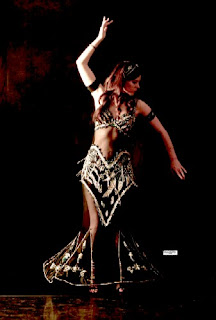Brillant article from Emma
In this post I will consider the following question: what SHOULD a professional belly dancer be? I am addressing anyone who considers themselves to have reached a point in their dance career where they can represent belly dance in public outside of a hafla setting[1], whether through performance or teaching. Student dancers, relax, I’m not talking about you . These are the standards I hold myself to. I am not claiming to be perfect and I have not always managed to fulfil all of these in the past, but when I fail to meet these standards I do my best to make sure I learn from that and do better next time.
So what makes a professional bellydancer?
Getting paid to dance
Well, yes, this is the most basic definition of a professional but actually it’s a bit more complicated than that. To quote my friend Kitty Kohl : “Somebody can behave professionally and still be a student, and they can be earning money as a teacher and a dancer and be totally not professional in any way.” Sometimes a professional will choose to waive their fee, for example, in support of a charity, but even without money changing hands they still give a professional standard performance. Discussions about money and professionalism are often derailed by arguments over what proportion of your income comes from dance, which is simply not relevant. In situations where you would reasonably expect an entertainer to be paid (birthday party, restaurant, wedding…) you should be paid, even if you only do one gig in a year.
There’s more to it than that. You should be getting paid a fair price, and if you’re not sure what that is you should ask. Hint: don’t ask a restaurant owner . You shouldn’t be undercutting the other dancers in your area and if you don’t understand why then you are not ready to be a professional dancer. If you think the standard of your dancing means you should be paid less than the average (“50% less than any other dancer!”) you are certainly not ready to be a professional dancer.
Technical standard
I wish it went without saying, but you must be able to bellydance well. I could write a whole other essay on what it means to “bellydance well” but for now I will stick to “execute isolated movements clearly and gracefully with good posture and demonstrable knowledge of stagecraft”. I’ve been involved in bellydance for over 12 years and have seen the overall standard of dance in the UK rise but still I come across videos that make me shake my head in sadness when I see that the dancer claims to be a professional or worse, teaches other people. And don’t come to me and say “But I only teach beginners!” because you will unleash a rant which makes this polemic sound like The Little Book of Calm!
A professional dancer should also have the necessary background knowledge for whatever she is performing. Know the style of music, the style of dance that goes with it, what the words mean etc. You can’t assume that your audience is totally ignorant. Maybe I am there in the back row, judging you If you are a fusion dancer, know what you’re fusing. Do you really feel “boxed in by styles” or are you just not prepared to put in the effort of learning about them? Believe me, it will show in your performance.
Professional development
There is no standing still in dance. As soon as you stop trying to push your dancing forward you start going backwards. The opportunities for professional development have simply exploded in the time I have been involved in the bellydance world. You don’t need to travel abroad to train with world-renowned dancers, but if you do want to there are plenty of people to help make that happen for you. Artists from Egypt, the US and Europe regularly visit the UK for festivals and intensive training weekends and of course we have some superb home grown teachers. There is a mind-boggling array of DVDs available on every subject related to bellydance, no matter how tangentially. And of course there is YouTube which is an amazing resource for different styles, dancers and settings if you can navigate your way through the dross. I will note here that “free classes on YouTube” are worth exactly what you pay for them. There is absolutely no excuse for stopping your dance education, and why would you want to? Learning is awesome!
If you are also a teacher then professional development also covers teacher training and health and safety. There are quite a few bellydance teacher training courses available although it looks like JWAAD is going to dominate the field for some time (disclaimer, I am JWAAD trained). There are also more general courses for teaching exercise to music such as that offered by the YMCA. You should seriously consider having a first aid qualification and some venues will require you to have one. Before you all email with me with the names of perfectly good teachers with no qualifications don’t bother. I KNOW THAT [EGYPTIAN TEACHER] HAS NO CERTIFICATE. I think that anyone starting out on their teaching careers NOW should undergo training.
Appearance
Oh boy, this one is a mine field. I think bellydance is more inclusive then most other dance forms when it comes to appearance. A wider range of body shapes and ages are acceptable to most audiences. For example, I would never have made it as a ballet dancer and even if I had I would have retired by now! However, we still have to dance in a society with certain expectations of what a bellydancer should look like and whilst I think many of them are ridiculous that is not what I want to write about today. How much each individual performer chooses to fulfil these expectations is their own business.
I am more interested in the cosmetic aspect of appearance. You should be well groomed, by which I mean clean (!), with suitable hair and makeup and a good costume. Good costume – now there’s a potentially loaded term. A good costume is well made, fits you and flatters your shape. It doesn’t reveal anything you don’t want revealing (I think we can all agree that bellydance should be family friendly). It’s appropriate for the style of dance you’re performing, the venue and the time of day.
Your costume doesn’t need to be a $1300 designer creation. It does need to be a costume i.e. “a bra from Target” with a few sequins stuck on it will not do. I cannot say this often enough, but a costume bra is very different to a lingerie bra. You can use your bra from Primark (I guess that’s equivalent to Target) as a base for your costume but it needs more work than ten minutes with a hot glue gun. Hint: if the original straps are visible it will always look like you are dancing around in your underwear. I wish I could forget the dancer I saw performing (in a professional setting) in white leggings, a coin belt that shed as she danced, and an undecorated bra from New Look. How do I know it was from New Look? Because I saw the exact same one there the day afterwards. Her costume was a perfect reflection of her dance ability. I had to be led away quietly for a strong drink.
Student dancers, please don’t be worried. If you are performing at haflas a simple long skirt and coin belt with a nice top is just fine as long as it satisfies the principles in that second paragraph. Just be aware that if you want to step outside the hafla setting you are going to need to invest money and/or time on your costuming.
Business skills
If you are earning money from dancing at some point you need to be registered for tax purposes, and that means keeping records and accounts. You also need to think about public liability insurance (you’d be extremely foolish to start teaching dance without it), music licensing, advertising, creating and maintaining a website…in short, pretty much everything a small business start up has to consider. You have to be able to deal with clients and customers in a professional manner. Can you accept a compliment? Can you handle a complaint? Can you deal with competition from other dancers, ideally without creating a rift that splits your community in two? This brings me onto…
Supporting the dance community
You can support the dance community in two ways: by playing nice and by not being an idiot. In other words, by taking positive actions and by avoiding engaging in negative behaviour (but I prefer the glib version!). So: playing nice. This includes everything discussed so far in order to be a good role model for the up and coming dancers in your community. It is also attending classes, workshops, haflas and festivals and encouraging other dancers or your students (if you teach) to do the same. You could go further and organise an event for your dance community. It is also important to show your support as an audience member, if you swan off as soon as your performance is over, or spend all your time hiding out in the dressing room, or sit scowling through every performance other than your friend’s (and I’ve seen all of these!) it will reflect badly on you.
Alas, without infinite time and money it is impossible to show positive support to everyone. You can still support the community in other ways. Not undercutting is a big one. Not allowing your personal feelings towards other professionals to interfere with your participation – we’ve got a small sandbox to play in which is why we have to play nice. Not scheduling your events to clash with someone else’s. Not representing bellydance in an inappropriate or sleazy way. I could go on but I think you get the idea.
I believe all of the above points are the absolute minimum necessary to make a professional bellydancer. The relevance of each is down to the individual – maybe your website is not as important to you as your training, for example – but no one point is sufficient. No, not even the one about being paid. The obvious next question to ask is “What makes a GOOD professional bellydancer?” and there’s a lot more scope for argument there!
[1] I make this distinction for the following reason. The definition of a hafla varies between regions but it is always an event put on by the bellydance community for the bellydance community, rather then the general public. A hafla is in no way inferior to any other performance setting.





